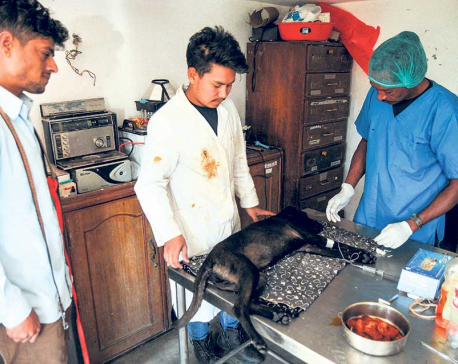
OR

Stray dogs are often at the receiving end of abuse out on the streets. People pelt stones, hit them with sticks and, worse, even run then over while driving recklessly. While it’s quite common to buy dogs of ‘good breed’ and people spend a lot of money on it, the situation of stray dogs is pitiable. Considered a nuisance and potential rabies carriers, they are either completely neglected or hunted down and killed. Angeela Shrestha, founder of Project Humane Nepal, established the organization to tackle this very problem.

Shrestha calls Project Humane Nepal a humane education organization dedicated to raising awareness about animal welfare issues and empowering children and youth to change the lives of animals around them and particularly the stray dogs. Shrestha mentions that Project Humane Nepal mentors students to become animal welfare ambassadors while teaching them to interact safely with dogs. “We also want to prevent animal suffering by responsible pet care and better the situation of animals in our communities,” she says.
Around the time the earthquake hit Nepal in 2015 was when Shrestha officially launched Project Humane Nepal. Before the launch, she was studying and doing similar work in the United States of America. While in America, Shrestha worked with Service Learning Academy where she coordinated several service learning projects with a local dog shelter, schools, and universities.
When she visited Nepal during her summer breaks, she found out, through observation and research, that majority of Nepalis have misconceptions about stray and pet dogs because the community isn’t aware about animal welfare. Project Humane Nepal was founded to raise awareness about the mistreatment of dogs in the country and to engage the community in being a part of the solution. Their educational outreach programs target positive changes in attitude, knowledge and behavior among Nepalis towards stray and pet dogs.
Shrestha found that many local organizations had been conducting routine animal birth control and vaccination interventions aiming to reduce potential rabies risk for both humans and animals. However, little attention was being given to initiating dog welfare education programs in schools and communities to put an end to animal cruelty. Project Humane Nepal strives to fill this gap and create a generation that is caring and compassionate toward dogs.
As this was kind of a new concept in Nepal, initially it was quite difficult for Project Humane Nepal to explain their motives and work process at schools and let them conduct awareness classes there. But now, Shrestha says, schools actually reach out to them to conduct these classes for their students. And the good thing is that the classes are quite effective. “Scientific studies show that effective humane education classes can foster empathy, improve knowledge and influence humane treatment of animals in the long run. In the past three years, our education interventions have resulted in increased knowledge and positive changes in students’ perception and behavior towards dogs,” she says.
For the awareness classes in schools, Project Humane Nepal has developed the syllabus content according to age, grade, and the type of class they conduct. The first is a one-time class that is favored by most of the schools. The other is a week-long workshop which is more detailed than one-time class. This workshop is five hours long and is conducted throughout the week in multiple 45 minutes or one hour long classes. Both the classes focus on safe interaction with dogs, responsible pet ownership, and compassion towards animals.
The course content for grade one to five is focused on dog bite prevention and safety, understanding dog body language and being a responsible pet owner. Shrestha says they try different strategies to make these sessions fun for kids as they don’t pay attention to things if they don’t enjoy it. She further adds that the classes are interactive and not lecture based. For seniors, the classes focus more about understanding the lives of homeless dogs and helping them, learning about dog overpopulation, rabies prevention, and information on dog shelters and their role in our community.
“These classes have been showing unexpectedly huge impacts. When we compare the before and after analysis from the students, the results are impressive. The kids get really into the cause and actually implement the things we teach them in their localities,” says Shrestha. She also reveals that initially she started Project Humane Nepal as a three-month long project to work on while she visited Nepal after the completion of her first semester of her masters program. But when the project yielded powerful results, she decided to carry on with it.
Co-founder Shraddha Kunwar was the one who primarily looked after Project Humane Nepal for about a year while Shrestha went back to Omaha to finish her post graduate studies. Beside them, the Project Humane Nepal team includes Jessika Ava, Kerry Ecklebe, and Pam Ashley as the advisory board members and a volunteer team of eight other individuals. They also have a team of influential Nepali celebrities like Rohit John Chettri, Jyotsna Yogi, Ashlesha Rana, and Rheanna Limbu as their Goodwill Ambassadors to promote the cause to a larger number of youths.
Project Humane gets their primary funding by selling their merchandise. They have locally produced a dog and cat themed line including products like notebooks, badges, and fridge magnets and sell it at Maya Ko Chino, different local markets, and through their social media accounts. They also have a GoFundMe page and receive grant support from The Pollination Project and Help Animals India. Lately, they have also started charging private schools for the week-long lessons for financial sustainability.
Shrestha mentions that she wants to conduct these classes in as many schools as possible. “We’ve only taught about 8000 kids as of now and there are thousands more we want to reach out to because everyone should address this issue. We have not been able to branch out of Kathmandu and Lalitpur. For more effective work process, I actually want to hire a team of full time staff but for that Project Humane needs more grant support. Since we’re a non-profit organization, it’s a completely volunteer based program. I’m still living from my student savings. To get to a higher level and have more outreach, we need more sponsors and I need to get a stable job,” concludes Shrestha.
You May Like This

Caring for strays
an Salter, a citizen of the United Kingdom, has spent many years in Nepal and is an animal lover. Salter... Read More...

Caring for Your Pet: Five Ways to Show You Love Animals
Having a pet can be a stressful and exhausting experience. No matter how trying your pet is, you will always... Read More...

Ford, GO Ford celebrate 'Global Caring Month'
KATHMANDU, Sept 28: Ford Motor Company kicked off the 11th annual Global Caring Month in September with Ford volunteers from... Read More...



Leave A Comment